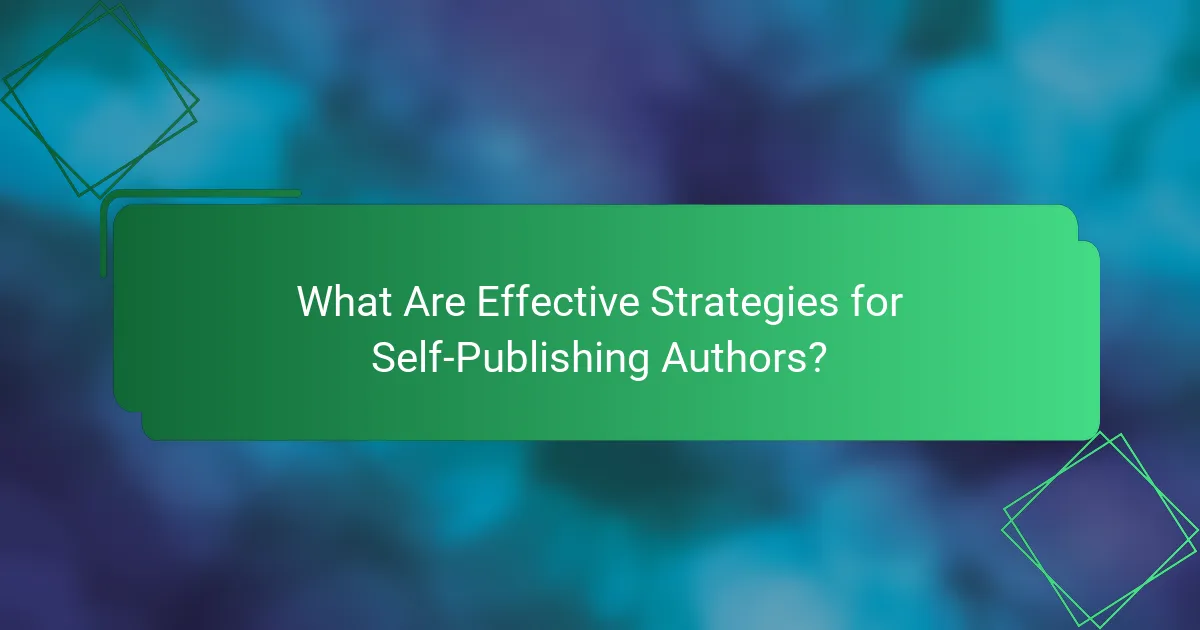In the competitive world of self-publishing, establishing a strong author brand is vital for long-term success. A recognizable identity not only differentiates authors in a crowded market but also fosters reader loyalty and encourages repeat purchases. By utilizing modern marketing strategies and engaging with their audience, self-published authors can build a sustainable brand that thrives over time.

How Can Author Branding Drive Long-Term Success?
Author branding is essential for achieving long-term success as it establishes a recognizable identity that resonates with readers. A strong brand helps authors differentiate themselves in a crowded market, fostering loyalty and encouraging repeat purchases.
Consistent messaging across platforms
Consistent messaging is crucial for reinforcing your author brand across various platforms. This means using the same tone, style, and key messages whether on social media, your website, or in your books. Aim for a cohesive narrative that reflects your values and themes.
To maintain consistency, create a brand guide that outlines your voice, visual elements, and core messages. This guide will serve as a reference to ensure all your communications align with your brand identity.
Engaging with readers through social media
Social media is a powerful tool for engaging with readers and building your author brand. Platforms like Twitter, Instagram, and Facebook allow you to share insights, updates, and personal stories that connect you with your audience.
To maximize engagement, post regularly and interact with your followers by responding to comments and messages. Consider hosting live Q&A sessions or virtual book readings to create a more personal connection.
Building a professional website
A professional website is a cornerstone of your author brand, serving as a central hub for your work and information. It should include your biography, a portfolio of your books, and a blog or news section to keep readers updated.
Ensure your website is user-friendly and visually appealing. Use high-quality images and a clean layout to enhance the user experience. Incorporate an email sign-up form to build your mailing list directly from your site.
Creating a unique author persona
Your author persona is how you present yourself to the world, and it should reflect your personality and writing style. This persona can be serious, humorous, or quirky, depending on what resonates with your target audience.
To develop your persona, think about the themes in your writing and how you want readers to perceive you. Use this persona consistently across all platforms to create a memorable identity that readers can connect with.
Leveraging email marketing
Email marketing is an effective way to maintain direct communication with your readers and promote your work. Building an email list allows you to share news, exclusive content, and special offers directly with your audience.
Consider offering a free chapter or a short story as an incentive for signing up. Regular newsletters can keep your readers engaged and informed about upcoming releases, events, or promotions, helping to strengthen your author brand over time.

What Are Effective Strategies for Self-Publishing Authors?
Effective strategies for self-publishing authors include leveraging modern tools and marketing techniques to enhance visibility and sales. By focusing on print-on-demand services, targeted advertising, collaborations, and search engine optimization, authors can build a sustainable brand and achieve long-term success.
Utilizing print-on-demand services
Print-on-demand (POD) services allow authors to publish physical copies of their books without the need for large upfront investments. This model minimizes financial risk by printing copies only when orders are placed, making it ideal for self-publishing authors.
Popular POD platforms like Amazon KDP, IngramSpark, and Lulu provide easy-to-use interfaces for uploading manuscripts and designing covers. Authors should consider factors such as printing costs, distribution options, and royalty rates when selecting a service.
Implementing targeted advertising campaigns
Targeted advertising campaigns can significantly increase an author’s visibility and book sales. Platforms like Facebook, Amazon, and Google Ads allow authors to reach specific demographics based on interests, behaviors, and location.
To maximize effectiveness, authors should define their target audience clearly and create compelling ad copy that highlights their book’s unique selling points. A budget of a few hundred dollars can often yield valuable insights and sales, especially when campaigns are optimized over time.
Participating in author collaborations
Author collaborations can expand reach and enhance credibility. By partnering with other authors for joint promotions, anthologies, or cross-promotional efforts, self-published authors can tap into each other’s audiences.
Networking through social media, writing groups, or local author events can lead to fruitful partnerships. It’s essential to choose collaborators whose work aligns with your genre and values to ensure a cohesive promotional effort.
Optimizing book listings for search engines
Optimizing book listings for search engines is crucial for increasing discoverability. This involves using relevant keywords in the book title, description, and metadata to improve search rankings on platforms like Amazon and Google.
Authors should conduct keyword research to identify popular search terms related to their genre. Regularly updating book descriptions and utilizing engaging cover images can also enhance visibility and attract potential readers.

How Important Is Audience Engagement?
Audience engagement is crucial for self-published authors as it fosters loyalty and encourages word-of-mouth promotion. Engaging with readers helps build a community that supports your work and enhances long-term success.
Fostering a community around your work
Creating a community around your writing involves connecting with readers on various platforms. Consider using social media, author websites, or dedicated forums to share insights, updates, and personal stories related to your work.
Encourage discussions and interactions by asking questions and responding to comments. This not only strengthens relationships but also makes readers feel valued and invested in your journey.
Collecting and responding to feedback
Feedback is essential for growth as an author. Actively seek input from your audience through surveys, reviews, or direct messages to understand their preferences and expectations.
Responding to feedback shows that you value your readers’ opinions. Acknowledge their suggestions and consider incorporating them into future projects, which can enhance reader loyalty and satisfaction.
Hosting virtual events and book signings
Virtual events, such as webinars or live Q&A sessions, can significantly boost audience engagement. These events allow you to connect with readers in real-time, share insights about your work, and discuss themes or characters.
Consider organizing online book signings or readings where fans can interact with you directly. Promote these events through social media and your mailing list to maximize attendance and create a buzz around your work.

What Role Does Social Media Play in Author Branding?
Social media is crucial for author branding as it helps writers connect with their audience, showcase their work, and build a personal brand. By engaging with readers on various platforms, authors can enhance their visibility and foster a loyal following.
Building a following on platforms like Instagram
Instagram is a visual platform that allows authors to share images related to their books, writing process, and personal life. By posting regularly and using relevant hashtags, authors can attract followers who are interested in their genre or writing style.
Consider hosting giveaways or collaborating with other authors to expand your reach. Engaging with followers through comments and direct messages can also strengthen relationships and encourage loyalty.
Using Facebook groups for reader interaction
Facebook groups provide a space for authors to interact directly with readers and fellow writers. Joining or creating a group focused on a specific genre can facilitate discussions, share updates, and gather feedback on works in progress.
Authors should actively participate by posting questions, sharing insights, and responding to members. This interaction not only builds community but also establishes the author as an approachable figure in their niche.
Creating engaging content on TikTok
TikTok has rapidly become a popular platform for authors to showcase their creativity through short videos. Authors can create book trailers, share writing tips, or participate in trending challenges to capture attention.
To maximize engagement, focus on authenticity and storytelling. Using popular sounds and hashtags can help reach a broader audience, while consistent posting can keep followers engaged and interested in upcoming releases.

What Are the Key Metrics for Measuring Success?
Key metrics for measuring success in self-publishing include sales figures, reader engagement, and brand recognition. These metrics help authors assess their performance and make informed decisions to enhance their visibility and profitability.
Sales Figures
Sales figures are a primary indicator of success for self-published authors. Tracking the number of copies sold over time can reveal trends and help identify which titles resonate most with readers. Authors should monitor both digital and print sales across various platforms, such as Amazon and local bookstores.
It’s beneficial to set specific sales goals, such as selling a certain number of copies within the first month or quarter. Comparing sales against industry benchmarks can provide context, helping authors understand where they stand relative to peers.
Reader Engagement
Reader engagement measures how actively readers interact with an author’s work. This can include metrics like reviews, ratings, and social media interactions. High engagement often correlates with a loyal readership, which is crucial for long-term success.
To enhance reader engagement, authors can encourage reviews by offering incentives or hosting giveaways. Engaging with readers through newsletters or social media can also foster a sense of community, leading to increased loyalty and word-of-mouth promotion.
Brand Recognition
Brand recognition reflects how well an author is known within their genre and among readers. This can be gauged through social media following, website traffic, and mentions in media or blogs. A strong brand can lead to increased sales and opportunities for collaboration.
To build brand recognition, authors should focus on consistent messaging and visual identity across all platforms. Regularly participating in events, such as book fairs or online webinars, can also enhance visibility and establish authority in their niche.
